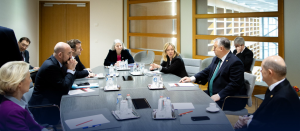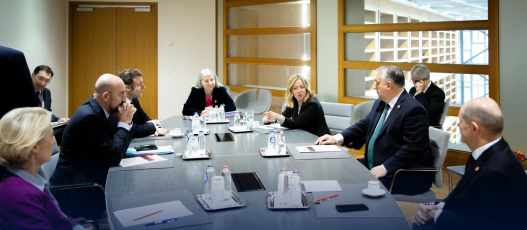
ORBÁN BACKS DOWN ON EU AID TO UKRAINE
By Julio García
It is already known that Hungarian Prime Minister Vicktor Orbán does not make it easy for the EU to support some initiatives.
In the case of a joint loan to finance an aid to Ukraine worth 50 billion euros, last December, Orbán reiterated his refusal to help a country that still suffers the consequences of a war. “We do not want a joint credit,” he said at the time, considering that the aforementioned credit would be a “destructive” measure for the EU budget.
However, the pressures of the last few weeks have been such that the Hungarian leader has caved in and Hungary has lifted its veto on the aid package to Ukraine over the next four years in exchange for minor concessions.
In a short meeting of the European Council on this issue and several previous preparatory meetings, the Hungarian leader gave the surprise and supports the aid initiative to Ukraine, without being able to veto it every year as he intended, although he will have the possibility to review the disbursement of aid on an annual basis.
The conclusions of the last European Council underline the need to ensure, together with partners, stable, predictable and sustainable financial support to Ukraine for the period 2024-2027. In order to contribute to the recovery, reconstruction and modernization of the country, promote social cohesion and progressive integration into the Union, with a view to possible future accession, a Ukraine Facility will be established for the period 2024-2027.
Furthermore, the text of conclusions opens the door to a general review of the budget in two years’ time if the unanimity of the capitals so dictates. Something that seems very difficult to achieve.
The document also recalls that a mechanism agreed in 2020 and allowing the freezing of funds if a country does not respect the rule of law must be carried out in a proportionate manner. (NDLR: Orbán asked to include that detail, in the hope that this will help him to release the 22 billion euros that the Commission has blocked to Hungary for violations of the rule of law). A reference that does not exempt Hungary from continuing with the withheld funds. Although these concessions from the EU-27 club may seem insufficient, they allow Orbán to make believe that his concession is a triumph for his country.
In fact, he has already stated: “Mission accomplished. Hungary’s funds will not end up in Ukraine and we have a control mechanism at the end of the first and second year. Our position on the war in Ukraine remains the same: we need a ceasefire and peace talks.”
For his part, Council President Charles Michel that this financial package ensures “firm, predictable and long-term financing for Ukraine”. Just what the EU-27 wanted, in the face of fears of a succession of constant vetoes by Hungary. “Today Europe is becoming stronger,” celebrated European Commission President Ursula von der Leyen.
And Ukraine’s reaction to this EU initiative came from its president, Volodimir Zelenski, who expressed his gratitude for this green light and stressed that an agreement with the EU-27 exemplifies “European unity”.
Ukraine is in dire need of money so that the country can continue to function and these needs have increased following the blocking of funds in the U.S. Congress.
—-
This news was originally published by Aquí Europa, with whose permission we reproduce it.



